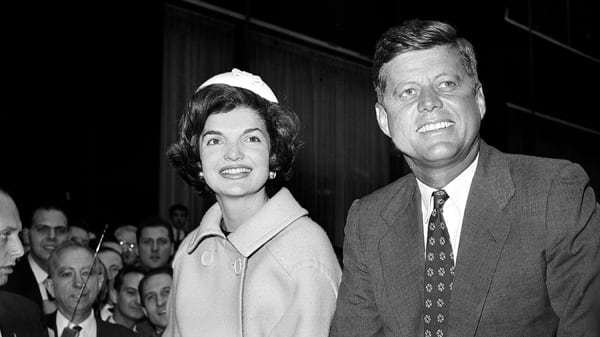What struck me in the Jacqueline Kennedy tapes is how much she knew. Thanks to her just-released oral history, Jacqueline Kennedy: Historic Conversations on Life with John F. Kennedy with a foreword by Caroline Kennedy and an introduction by Michael Beschloss, we have a unique new look at a heroic American president.
I offer this judgment based on years of interviewing others close to Jack Kennedy—school chums, war buddies, life-long friends. In her treatment of every episode, his wife offers an account that not only parallels but embellishes the record.
It also tells us much about Jacqueline Kennedy’s role in history. For decades she has loomed forth as a beautiful “First Lady” devoted only to the trapping’s of the American presidency. Here in these tape recordings we get the genuine article, a woman engaged intellectually and emotionally in the real-life struggle of leading this country. She knew her beloved husband’s pain, felt his worries, and knew the fight he waged to get to the White House and to hold sway once there.
What I’ve just said there is not an argument but an established fact. Read the book or listen to the accompanying CDs. It’s all there. The tapes show a real marriage, not a handsome, worldly president living in one world, his elegant spouse living in another. They are a public record of how Jacqueline shared in her husband’s defeats, witnessed his tears, felt his fears, and knew his dreams. Anyone who thought Jacqueline Kennedy was cut off from the day-to-day trials of the New Frontier has now been briskly disabused.
Good for Caroline, I say, that she’s getting these tapes out. Too much of the real Jack Kennedy legacy has been taken off by the grave robbers, leaving behind just the pretty “Camelot” pictures and the conspiracy theories about his death.

It’s as if the Kennedy presidency consisted of nothing more than a dubious glamour and tragedy, the dalliances and Dallas. Lost has been the treasure: the story of the early 1960s, that brisk, upbeat, all-too-brief set of years when a young president skippered us through the worst peril of the Cold War, committed himself to civil rights, inspired the idealism of the Peace Corps, championed the high adventure of the space program.
Jackie’s tapes speak well of these years, when the country’s eyes were up and beyond. She speaks in earnest of this time that was, quite simply, grander.
So, she reminds us here, was the man at the center of these years. What’s best in her account are the several rebuttals she slams at the conventional wisdom. At critical points she ratifies surprising truths that were known only to those who knew Jack Kennedy well.
She described the horror of those botched surgeries in 1954 and 1955, how afterward Jack was forced to fake a recovery. “He’d walk about the Senate looking wonderful and tan … and then he’d come home and go in to a hospital bed.” She’s portraying the classic behavior of the World War II generation: never complain; never explain.
She mentions the “black periods” resulting from these relentless back problems which kept him, if not on crutches, wearing a corset the rest of his life. She shares with us the blunt disclosure that her husband “couldn’t put on his shoes” and that those relentless Novocain shots he took for his back “didn’t do any good anymore.”
Nor was it just his weakened back that hounded him. There was also the stomach “trouble” that never subsided. Both ailments, which had their origins well before World War II, would never leave him.
“He was always sick and in bed. He had scarlet fever … blood trouble … anemia,” Jacqueline says here. That “blood trouble” was the leukemia Jack’s doctors long feared he’d contracted in his teen years. Later came the Addison’s disease, episodes of which, in 1947 and 1951, led to his receiving the last rites.
She confides the degree to which Jack’s never-ending illnesses made life sometimes barely tolerable for him. “ 'I wish I had more good times,' ” she recalls him saying. “I suppose what he meant was that he had been in pain so much.”
Not exactly the charmed life his countrymen imagined he was savoring all those years.
What intrigued me, personally, in these just-released tapes is Jacqueline’s political savvy. For all her talk of getting her political views from her husband, she seemed to know quite a bit about the hardball politics he was up to.
One episode was her husband’s ferocious 1956 fight to unseat William “Onions” Burke as Massachusetts Democratic party chair. “That was the only time in all of the fights he’s been through when I’d really seen him nervous … when he couldn’t talk about anything else.”
One sure cause of the Bay of Pigs disaster, she says here, was the fact that, unlike that early battle with “Onions” Burke, which ended in Jack’s victory, here he simply “wasn’t running his own show.”
But if she knew the burdens on her husband, she also knew the strengths he carried.
Start with his ambition. She debunks, as have others in Jack’s golden circle of friends, what she calls here the “trite story” that her husband had gone into politics simply because his older brother, Joseph Jr., had been killed in World War II.
“It’s just not as simple as that story sounds.”
The truth is, Jack was lured by the political life long before. Even before entering The Choate School, he’d devoured Winston Churchill’s history of the First World War. Once there, he was known to read The New York Times on a daily basis. He was the kind of teenager who knew things that weren’t taught in school, most of it about history and politics. He was destined for that world, a fact known by classmates and, later, by war buddies as well.
There was also the matter of Jack’s insatiable curiosity.
“He’d read walking, he’d read at the table, at meals,” his wife explained. “He’d read after dinner, he’d read in the bathtub, he’d read—prop open a book on his desk—on the bureau—while he was doing his tie.”
This penchant for reading is what Jack’s sister Jean told me was what made him different. Being sick much of his youth, he developed a huge appetite for reading. It made him what he was, far more of an intellectual than the rest of the family. An interest which started with King Arthur and stories of the Round Table led to Winston Churchill and his first-hand account of 20th century war. It had the effect of feeding his intellect as well as his ambition.
Jacqueline Kennedy knew, it’s now manifestly clear, how Jack organized and navigated his life. “You’d think he belonged to so many people and each one thought they had him completely.” “He really kept his life so in compartments,” she said. And in every one, there were people “ready to die for him.”
“It’s just now that you see how Jack just knew in every side of his life what he wanted.”
Finally, Jacqueline relates Jack’s strongest trait. It was his ability to separate his feelings and those of others from his decision-making.
“I always thought he would have been the greatest judge. Because he could take any case—it could involve himself, or me or something, where you—with anyone else, your emotions would be so involved—and look at it from all sides.”
She’s referring to Jack’s exquisite ability to navigate America through the Cuban Missile Crisis. It was this ability to separate himself from the emotions of those around him that must have made being his wife so deeply painful.
She understood completely that his greatest achievement, as he saw it, was the 1963 limited nuclear test ban treaty with the Soviet Union. She saw that the vital influences were British Ambassador David Ormsby-Gore and Prime Minister Harold Macmillan. She called the treaty “the one thing that matters in this whole century.”
I’ve long had the hunch that, of all the people around him, Jacqueline Kennedy knew her husband the deepest. That made her loving him all the more powerful.





